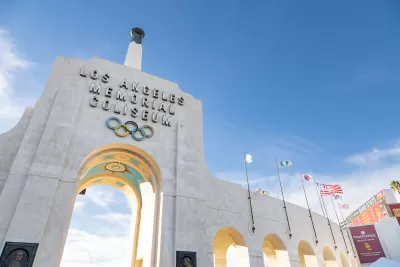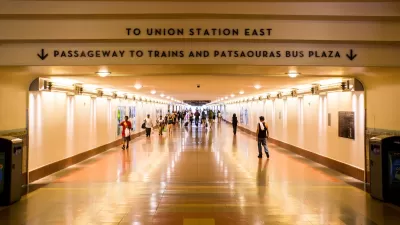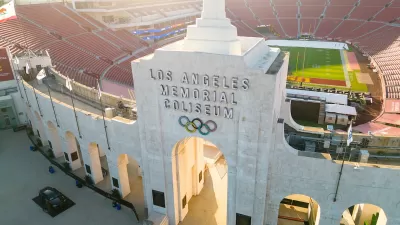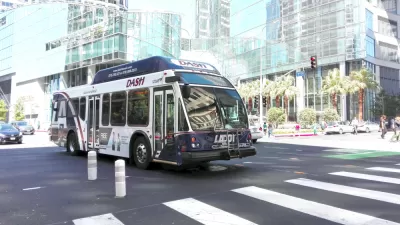The latest report from the Los Angeles County Metropolitan Transportation Authority says the 2028 Summer Olympics host city is falling behind on its transit improvement plan and likely won't catch up in time for the Games.

As the 2024 Summer Olympics in Paris enters its final days, some are turning their attention to the 2028 Summer Games in Los Angeles and the status of preparations. Five years ago, the city announced an ambitious plan to complete “28 by 28” transit projects to facilitate the movement of the more than one million visitors the Games will bring. But, despite recent influxes of cash, including $900 million in infrastructure funding and a $77 million grant to electrify its bus fleet, it’s looking like LA will fall short of its goal by 10 of the 28 projects, according to a recent article from NBC 4 News out of Southern California.
The Los Angeles County Metropolitan Transportation Authority’s latest report shows that of the 28 projects, only three have been completed, seven are currently under construction, and the final ten are expected to be finished after 2028. The reason? Delays, rising costs, and a funding gap of millions of dollars, which the city is depending on existing city resources as well as state and funeral funding to fill, as it has promised no additional taxes on residents.
“Despite the delays, [Metro] officials are hopeful that the transit system improvements will eventually meet the needs of the city and its residents,” writes NBC Reporter Lolita Lopez. But the skepticism expressed by many in 2017 when the city was first selected to host the 2028 Olympic and Paralympic Games remains. The doubters fear that instead of coming out of the Games ahead, both economically and with improved infrastructure, as promised, the event will result in a financial disaster like it has for past host cities, including Tokyo’s $7.2 billion loss in 2020.
Update (8/21/2024): Interim LA Metro Communication Director Missy Colman emailed Planetizen with the following correction, which differs from the numbers and dates reported in the NBC Los Angeles article summarized above: "Of the 28 projects in the recently prioritized Twenty-eight by ’28 plan, (5) are complete, (3) are expected to open before the end of 2024, 5 are scheduled to open in 2025, 3 are scheduled to open in 2026, 8 are slated for 2027 and the remaining 4 will open in 2028, prior to the Olympics."
FULL STORY: Los Angeles transit projects delayed ahead of 2028 Olympics

Alabama: Trump Terminates Settlements for Black Communities Harmed By Raw Sewage
Trump deemed the landmark civil rights agreement “illegal DEI and environmental justice policy.”

Planetizen Federal Action Tracker
A weekly monitor of how Trump’s orders and actions are impacting planners and planning in America.

The 120 Year Old Tiny Home Villages That Sheltered San Francisco’s Earthquake Refugees
More than a century ago, San Francisco mobilized to house thousands of residents displaced by the 1906 earthquake. Could their strategy offer a model for the present?

LA’s Tree Emergency Goes Beyond Vandalism
After a vandal destroyed dozens of downtown LA trees, Mayor Karen Bass vowed to replace them. Days later, she slashed the city’s tree budget.

Sacramento Leads Nation With Bus-Mounted Bike Lane Enforcement Cameras
The city is the first to use its bus-mounted traffic enforcement system to cite drivers who park or drive in bike lanes.

Seattle Voters Approve Social Housing Referendum
Voters approved a corporate tax to fund the city’s housing authority despite an opposition campaign funded by Amazon and Microsoft.
Urban Design for Planners 1: Software Tools
This six-course series explores essential urban design concepts using open source software and equips planners with the tools they need to participate fully in the urban design process.
Planning for Universal Design
Learn the tools for implementing Universal Design in planning regulations.
Ada County Highway District
Clanton & Associates, Inc.
Jessamine County Fiscal Court
Institute for Housing and Urban Development Studies (IHS)
City of Grandview
Harvard GSD Executive Education
Toledo-Lucas County Plan Commissions
Salt Lake City
NYU Wagner Graduate School of Public Service





























